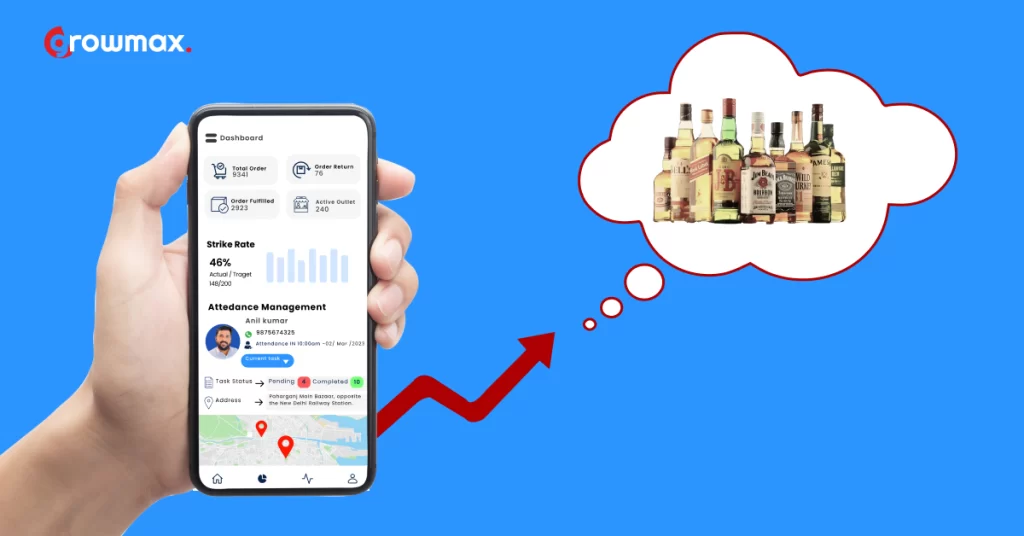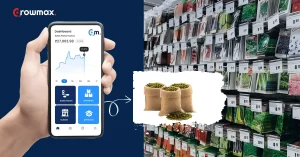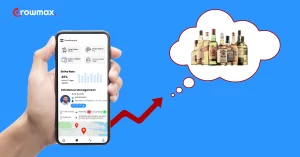The complete success of any liquor company in the alcoholic beverage market relies upon many factors, though the major ones are product innovation, pricing, marketing strategies, and customer loyalty; however, these elements are also unlikely to work out unless there is an efficient and streamlined operation.
According to a stat by McKinsey, The B2B sales team spends a disproportionate amount of their time—more than 50 % in some cases— serving customers that serve 20 % or less of the brand’s revenue.
The above data is related to liquor brands as they are failing to meet their forecasted targets due to loss of sales, which is directly proportional to the performance of their sales team.
Therefore, there is an urgent need to point out all those bottlenecks that don’t allow brands to achieve their goals.
What are the field-related challenges in the liquor industry?
Sales reps put their efforts, filled with sweat, into the market to garner businesses to accomplish their targets, but they somehow encounter failure at the end of the day. The problems that liquor industry brands need to look upon to make improvements:
Issue of unproductivity
It has become more than usual for liquor brands to see inefficacy in the activities of salesforce due to the execution of manually driven tasks that consume an ample amount of time.
For instance, a sales representative is assigned to handle the funnel of lead qualification to determine which prospects are the best sales target.
At the same time, the above process is not only constrained to time consumption but is also costly for the business.
Poor sales forecasting ability
There needs to be more communication between managers and sales reps being tasked on the field.
The former needs to access real-time insights into the latter’s actions, leading to the creation of stale decisions, eventually hampering the overall business.
Due to the unavailability of structured data, the prediction of future sales is invincible, leading to irrational sales targets.
Broken traceability of team
Brands fail to monitor the performance of their field team in real time, ultimately hampering the entire reward system.
Moreover, brands lose connectivity with their reps as soon they enter the market.
Due to needing proper tools, liquor brands must know whether their team frequently follows up with the top outlets.
Formless reporting and analysis
Humans who need more perfectionism fill liquor market trends analysis with errors and omissions that impact customer preferences.
There needs to be a proper mechanism for eliminating manual data entry of sales-related information.
Brands struggle to extract valuable insights from data due to weak infrastructure and limited analytical tools.
What is sales force automation?
Simply put, the role of SFA is to streamline the process of eliminating repetitive tasks by introducing technology into business.
It is responsible for automating manually driven activities in the sales process to save valuable time for representatives.
Furthermore, it streamlines the entire sales operation to bring forth productivity in the organization to ensure that field teams don’t do mindless tasks.
Instead of just boosting efficiency, this approach also helps brands beat their competitors in the market.
What are the benefits to the liquor industry post-SFA onboarding?
All the significant obstacles that liquor brands deal with are discussed above. And the solution to those problems revolves only around sales force automation. Hence, we need to understand the functions of SFA first off:
No more negative results
SFA aids in boosting the efficiency of sales teams by cutting down the unnecessary and time-consuming tasks to make them perform better.
It allows sales reps to focus on the high-value work, affecting liquor brands’ revenue, like calling prospects, pitching to retailers, attending meetings on time, etc.
Alongside this, it assists brands in tailoring their accuracy level by eliminating the scope of errors.
Get access to insights in real-time.
Interactive SFA dashboards, just like GrowmaxBI, display critical information within seconds, like pipeline stages of prospects, conversion rates, lead engagement rates, issues in performance, etc.
Managers can now immediately attain sales-activities-related insights with a single click on their mobile.
Real-time data helps brands rapidly react to changing marketing conditions as it assists them in making informed and faster decisions.
Decline in unessential costs
Although businesses incur several costs during the sales process, many are unnecessary.
With the help of cloud-based SFA, liquor brands can eliminate the expenses of sticking to manual methods.
SFA aims to reduce operational costs and expenses associated with customer acquisition and retention.
There is no communication barrier within the team.
Managers can now smoothly and directly communicate with field reps for problem-solving, quick clarification, opportunity discussion, etc.
Platforms like GrowmaxBI’s SFA aid in tracking reps’ activities and pointing out their wrongdoings with alerts.
At last, effective communication between managers and field teams ultimately backs liquor brands in taking real-time actions.
Last few words
Utilizing sales force automation software offers numerous benefits to the liquor industry, including increased efficiency and improved sales operation management.
If you crave more insights on using sales force automation to get profound clarity,




